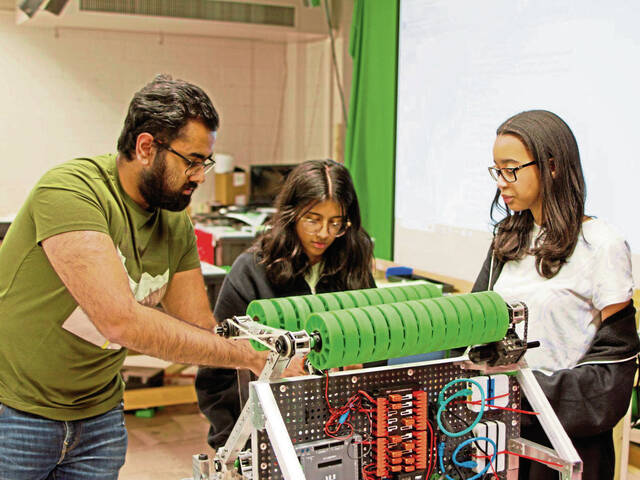https://triblive.com/local/monroeville/gateway-club-readies-for-regional-robotics-meet/
Gateway club readies for regional robotics meet

Who says girls don’t like science?
“At a very young age, before I could even walk, I was obsessed with technology: computers, anything,” Gateway High School freshman Bailey Blanton recalled. “That’s all I wanted to do. I would not play with Barbie dolls, nothing. It was all electronics.”
So naturally, she spent lots of time attending various camps and classes to learn as many related skills as she could.
“And finally,” she said, “I found my way here.”
Bailey is part of Gateway’s Quasics Robotics Club, which offers students an opportunity to broaden their knowledge in science-related subjects while providing them with experiences that should pay off handsomely later in life.
For now, their focus is on preparing for the FIRST Robotics Greater Pittsburgh Regional competition, scheduled for April 6-8 at the David L. Lawrence Convention Center, with “For Inspiration and Recognition of Science and Technology” forming the acronym of the international youth organization offering the event.
This year, Quasics members named their robot Gladys after a woman who probably had plenty in common with Bailey during her formative years. Mathematician Gladys Mae West, who turned 92 in October, was instrumental in the development of the Global Positioning System, which a lot of folks take for granted these days as GPS.
Starting in January, the Gateway students worked with their coaches and adult mentors to build Gladys and program the robot to perform as well as possible in competition.
“This year’s task for the robot is to pick up cones and cubes, either off the floor or off designated locations, and place them into other designated locations,” junior Matthew Bandos explained.
Behind scenes, but essential
He is the software lead for Quasics, guiding team members who provide an essential, if behind the scenes, robotics component. They write code in a programming language called C++ — yes, it originally was just plain “C” — that guides Gladys.
Students serving as drivers manipulate the robot using “a PlayStation control, basically,” Matthew said, with dual joysticks directing movements on either side.
Part of the FIRST competition involves no human interaction, with Gladys depending solely on what the students have come up with for the programming code.
“At some specific points during the match, the robot has to balance itself on, in layman’s terms, a see-saw. It’s a movable platform that tilts, based on the robot’s center of mass,” Matthew explained. “After a series of tests, we were able to solidify at least some sort of numbers to allow the robot to self-balance.”
He also is working on using a camera aboard the robot to identify crucial objects during competition.
“This will speed up the time that our drivers need in order to align the robot with the scoring,” he said. “There’s a limited time frame, and our goal is to score as many game pieces as possible.”
In another aspect of getting Gladys ready for competition, sophomore Salma Mukhtar leads a subteam concentrating on the robot’s intake mechanism
“It rolls in and picks up the pieces, and then we have different ways to eject them,” she said.
She and Matthew were nominated by head coach Sean McMahon and other Quasics coaches for the Dean’s List Award, FIRST’s recognition of leadership and dedication among participants in 10th and 11th grades.
“When we go to competition,” Salma said about the regional event, “we’ll have interviews, and then they’ll select who gets to move on to the next round. I did this last year. I presented to the judges, and I gave them a rundown of our community service and our team.”
Selection of the Dean’s List winners will take place at the FIRST Championship, the culminating international event for the youth robotics competition season, from April 19-22 in Houston.
Informing the community
Regarding community service, Quasics has a tradition of taking robots to Monroeville-area events with the purpose of providing information about what the team does and its technological specialty, in general. The club also partners with Girl Scouts Western Pennsylvania, working with Scouts in earning their badges for Science, Technology, Engineering and Mathematics.
“We awarded our 600th Girl Scouts STEM badge in late January,” McMahon reported.
Along with enhancing her knowledge as a high school student, Salma is looking toward her future.
“I’ll talk to people who are employing, and they’ll always look for people with FIRST experience, and not even just in engineering, because we’ve developed so many teamwork collaboration skills,” she said. “We also work with other teams. We’re not always rivals.”
In fact, McMahon co-founded the Steel City Robotics Alliance, which allows area robotics teams, Quasics included, to share resources and information.
“My coaches are so good. They’ve helped us so much,” Salma said. “I love doing this, because I want to become an engineer. So I feel like it’s doing me good with base skills.”
Teammate Bailey agrees.
“It’s helped me create new skills and helped me work with different people who also want to be in the same field as me,” she said, and as for her dream job:
“I would love to work at Google.”
Copyright ©2026— Trib Total Media, LLC (TribLIVE.com)
